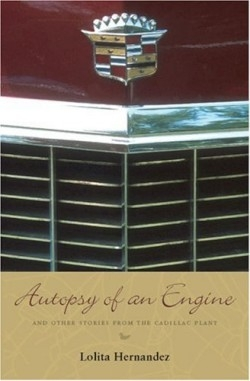Autopsy of an Engine
And Other Stories from the Cadillac Plant
Like lifting the hood of one of the many new cars that the now-closed Cadillac plant in Detroit, Michigan rolled out over the years, opening this book gives readers a look at the inner workings of the people who built the cars that symbolized American luxury for so long. Through the dozen stories that make up her book, the author shares intimate snapshots of the folks who put their hearts and souls into creating other people’s American dreams, whether they found themselves working in the plant by choice or by chance.
Hernandez’s unique perspective on the factory lines comes from her personal experience: she has more thirty years of experience as a UAW worker, more than twenty of them at the Cadillac plant. While in her introduction Hernandez makes it clear that these poignant characters are fictional, they are affecting and obviously strongly rooted in the work family that Hernandez and her fellow line workers became over the years.
The title character in “Thanks to Abbie Wilson” finds closure after her plant’s operations are dismantled by recreating her own little corner of the assembly line, complete with the homemade pound cakes for which she was so well known around the factory.
In “We Have a Job for You,” Patsi Wheeler, an employment office manager walking around the factory with her own pink slip in her pocket for the past week, finds herself making an unexpected statement to the throngs of hopeful job applicants gathered outside the building.
Autopsy of an Engine is an unconventional collection of short stories. Hernandez demonstrates an onomatopoeic and rhythmic writing style, conducting the repetitive “hmmmm, hmmmm, phlump,” “thuup,” and “pshoop”of the line workers’ machinery as if it were a symphony. What little is seen of the factory workers’ personal lives through these vignettes is filtered through their experiences at the plant; the technique reinforces the family of circumstance that many of the auto workers became.
With an honest look at the ups and downs of being an auto factory worker in a declining yet archetypal American industry, this book, with its blue-collar setting, immigrant and women’s experiences, and pull-no-punches style, should appeal to readers seeking realistic and uniquely American fiction presented with humor and a bittersweet tone.
As the book winds down, it’s like watching the last car roll off the assembly line and drive off into the sunset. The Cadillac factory is closed; those cars will never come this way again, nor will the folks who made them.
Reviewed by
Amy Brozio-Andrews
Disclosure: This article is not an endorsement, but a review. The publisher of this book provided free copies of the book to have their book reviewed by a professional reviewer. No fee was paid by the publisher for this review. Foreword Reviews only recommends books that we love. Foreword Magazine, Inc. is disclosing this in accordance with the Federal Trade Commission’s 16 CFR, Part 255.

